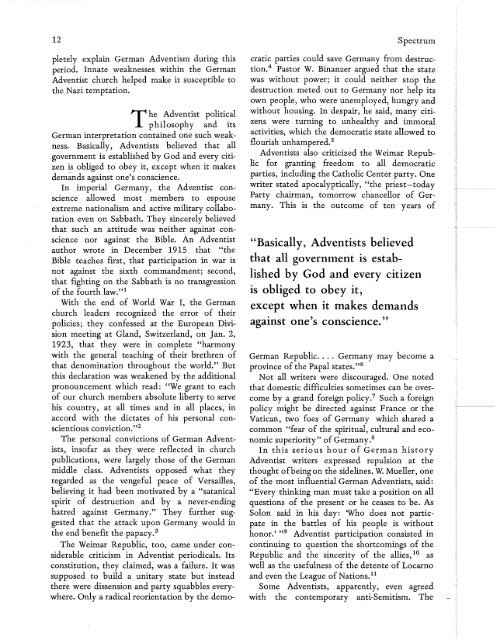Seventh-day Adventist Publications and The Nazi Temptation
Seventh-day Adventist Publications and The Nazi Temptation
Seventh-day Adventist Publications and The Nazi Temptation
You also want an ePaper? Increase the reach of your titles
YUMPU automatically turns print PDFs into web optimized ePapers that Google loves.
12pletely explain German Adventism during thisperiod. Innate weaknesses within the German<strong>Adventist</strong> church helped make it susceptible tothe <strong>Nazi</strong> temptation.<strong>The</strong> <strong>Adventist</strong> politicalphilosophy <strong>and</strong> itsGerman interpretation contained one such weakness.Basically, <strong>Adventist</strong>s believed that allgovernment is established by God <strong>and</strong> every citizenis obliged to obey it, except when it makesdemmds against one's conscience.In imperial Germany, the <strong>Adventist</strong> conscienceallowed most members to espouseextreme nationalism <strong>and</strong> active military collaborationeven on Sabbath. <strong>The</strong>y sincerely believedthat such an attitude was neither against consciencenor against the Bible. An <strong>Adventist</strong>author wrote in December 1915 that "theBible teaches first, that participation in war isnot against the sixth comm<strong>and</strong>ment; second,that fighting on the Sabbath is no transgressionof the fourth law." 1With the end of World War I, the Germanchurch leaders recognized the error of theirpolicies; they confessed at the European Divisionmeeting at Gl<strong>and</strong>, Switzerl<strong>and</strong>, on Jan. 2,1923, that they were in complete "harmonywith the general teaching of their brethren ofthat denomination throughout the world." Butthis declaration was weakened by the additionalpronouncement which read: "We grant to eachof our church members absolute liberty to servehis country, at all times <strong>and</strong> in all places, inaccord with the dictates of his personal conscientiousconviction.,,2<strong>The</strong> personal convictions of German <strong>Adventist</strong>s,insofar as they were reflected in churchpublications, were largely those of the Germanmiddle class. <strong>Adventist</strong>s opposed what theyregarded as the vengeful peace of Versailles,believing it had been motivated by a "satanicalspirit of destruction <strong>and</strong> by a never-endinghatred against Germany." <strong>The</strong>y further suggestedthat the attack upon Germany would inthe end benefit the papacy. 3<strong>The</strong> Weimar Republic, too, came under considerablecriticism in <strong>Adventist</strong> periodicals. Itsconstitution, they claimed, was a failure. It wassupposed to build a unitary state but insteadthere were dissension <strong>and</strong> party squabbles everywhere.Only a radical reorientation by the demo-Spectrumcratic parties could save Germany from destruction.4 Pastor W. Binanzer argued that the statewas without power; it could neither stop thedestruction meted out to Germany nor help itsown people, who were unemployed, hungry <strong>and</strong>without housing. In despair, he said, many citizenswere turning to unhealthy <strong>and</strong> immoralactivities, which the democratic state allowed toflourish unhampered. 5<strong>Adventist</strong>s also criticized the Weimar Republicfor granting freedom to all democraticparties, including the Catholic Center party. Onewriter stated apocalyptically, "the priest-to<strong>day</strong>Party chairman, tomorrow chancellor of Germany.This is the outcome of ten years of"Basically, <strong>Adventist</strong>s believedthat all government is establishedby God <strong>and</strong> every citizenis obliged to obey it,except when it makes dem<strong>and</strong>sagainst one's conscience."German Republic .... Germany may become aprovince of the Papal states.,,6Not all writers were discouraged. One notedthat domestic difficulties sometimes can be overcomeby a gr<strong>and</strong> foreign policy.7 Such a foreignpolicy might be directed against France or theVatican, two foes of Germany which shared acommon "fear of the spiritual, cultural <strong>and</strong> economicsuperiority" of Germany.8In this serious hour of German history<strong>Adventist</strong> writers expressed repulsion at thethought of being on the sidelines. W. Mueller, oneof the most influential German <strong>Adventist</strong>s, said:"Every thinking man must take.a position on allquestions of the present or he ceases to be. AsSolon said in his <strong>day</strong>: 'Who does not particpatein the battles of his people is withouthonor.',,9 <strong>Adventist</strong> participation consisted incontinuing to question the shortcomings of theRepublic <strong>and</strong> the sincerity of the allies,lO aswell as the usefulness of the detente of Locarno<strong>and</strong> even the League of Nations. 11Some <strong>Adventist</strong>s, apparently, even agreedwith the contemporary anti-Semitism. <strong>The</strong>


